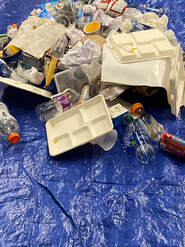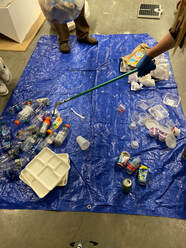By Peyton Dauley
Last Thursday, as the snow was falling and most were at home with hot cocoa and holiday movies, members of the MMHS Environmental Club dedicated an hour after school to a trash audit. Students sampled one bag from the recycling bin and one bag of trash, to study what their peers are throwing away, and whether their waste was rightfully placed.
So, what exactly does this mean? A trash audit is defined as an analysis of the trash or recycled product actually being collected by a certain dumpster--that is, what people throw away in a certain place, and whether this waste is being correctly disposed of. The purpose of performing a trash audit is often to create a more complex profile of what makes up local waste, and how this trash can be better utilized.
So, what exactly does this mean? A trash audit is defined as an analysis of the trash or recycled product actually being collected by a certain dumpster--that is, what people throw away in a certain place, and whether this waste is being correctly disposed of. The purpose of performing a trash audit is often to create a more complex profile of what makes up local waste, and how this trash can be better utilized.
The Mashpee High Environmental Club hopes to use this resource to survey what Mashpee students throw away, and whether there is any recyclable or compostable material amongst the waste. “Our goal is to assess how well we are recycling in the cafeteria, and if we are not doing well as we could, what are some specific things we can do to improve,” said Mr. Hoppensteadt, who runs the Environmental Club and also teaches classes like Ecology and A.P. Environmental Science at MHS. “Additionally, we want to determine if we can add quantity to the compostable material that is produced by the kitchen and is currently picked up by Compost With Me LLC out of Falmouth each week.”
First, the students studied the bag they collected from recycling. It weighed about five pounds total, and involved everything from cafeteria trays to leftover peas. After separating the actual recyclable material from the trash, then searching for compost waste within the leftovers, the Environmental Club measured the weight of their data. Of this one bag, only about half of the material was recyclable. The rest were trash items commonly mistaken for recyclable materials: milk cartons, soggy papers, and plastic utensils were some popular examples. Although most likely thrown into recycling with good intentions, these materials could sabotage all of the recyclable content by spreading food waste.
Next, students studied the trash bag. It weighed nearly eight pounds, and roughly half a pound of this waste was actually recyclable material.
To better understand their collected data, the Environmental Club will be calculating information in context as well. One such example would be how students plan to predict how much recyclable or compostable material is thrown away by Mashpee students over a certain period of time.
One indicative statistic that was mentioned was the amount of waste produced by MHS every day. An estimated 20 bags of trash are filled every day by students and faculty, and only one bag of recycling per day. While the trash audit cannot accurately represent all of these trash bags, such an unequal ratio may indicate that not all the material thrown away was properly placed.
While shifting through trash may not be everyone’s treasure, it is certainly a major undertaking of the Mashpee High School Environmental Club that will continue into this year. The Environmental Club has a history of significant local projects as well: from putting up bird boxes, to CoastSweeps.
“Basically, we think we can do better, but [we] need data to support our thoughts and then we can develop a better system to improve our efforts and help the town,” continued Mr. Hopp. The Environmental Club meets every first and third Thursday of the month.
One indicative statistic that was mentioned was the amount of waste produced by MHS every day. An estimated 20 bags of trash are filled every day by students and faculty, and only one bag of recycling per day. While the trash audit cannot accurately represent all of these trash bags, such an unequal ratio may indicate that not all the material thrown away was properly placed.
While shifting through trash may not be everyone’s treasure, it is certainly a major undertaking of the Mashpee High School Environmental Club that will continue into this year. The Environmental Club has a history of significant local projects as well: from putting up bird boxes, to CoastSweeps.
“Basically, we think we can do better, but [we] need data to support our thoughts and then we can develop a better system to improve our efforts and help the town,” continued Mr. Hopp. The Environmental Club meets every first and third Thursday of the month.

